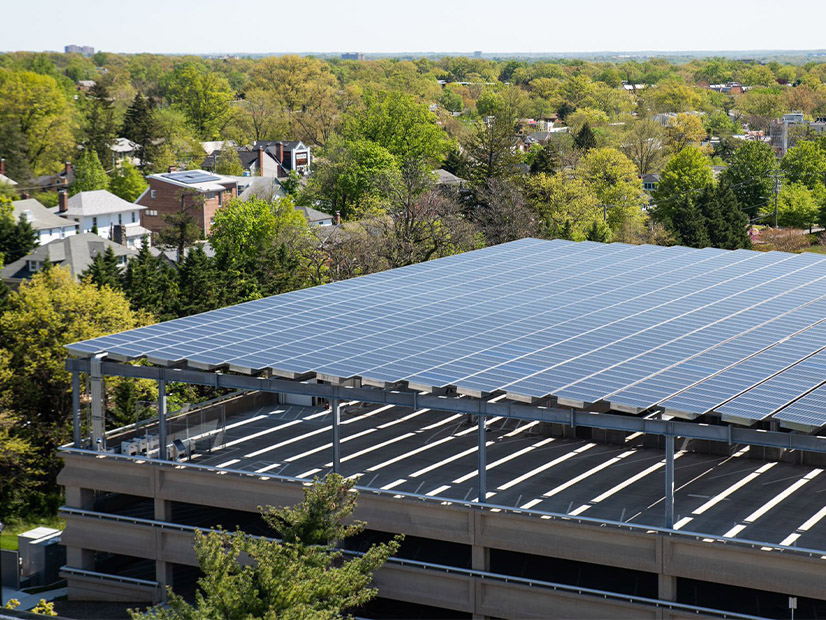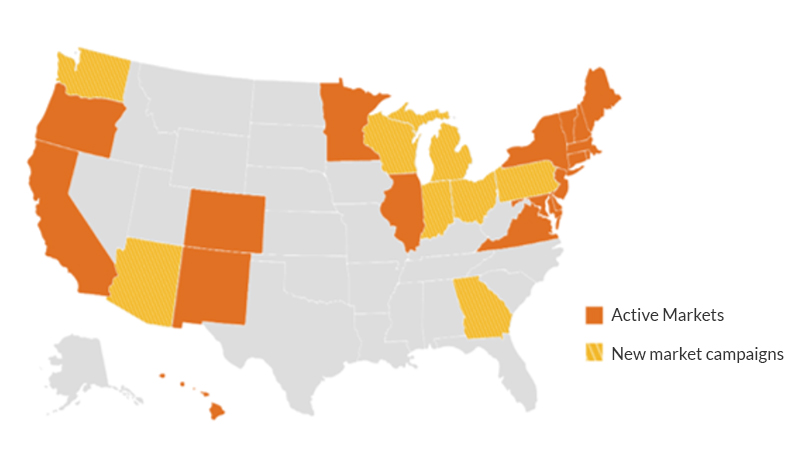
A Virginia Senate committee on Monday cleared a bill that would expand Dominion Energy’s community solar target sevenfold while changing how some consumers who use the resource are billed.
Dominion (NYSE:D), the largest utility in the commonwealth, has a target of just 200 MW for community solar, which is set to start rolling out after this July when the firm completes an update to its “customer information platform,” according to the Coalition for Community Solar Access.
The Senate Committee on Commerce and Labor voted 12-3 to clear Senate Bill 1266, which would increase Dominion’s target to 10% of its peak load.
Ten percent is the share the industry has pushed for in other states, CCSA Mid Atlantic Regional Director Charlie Coggeshall said in an interview. “That ends up being over 1.5 GW, so it’s a significant jump from 200 MW, but we think that the scale is appropriate to the size of the utility and the size of the market,” Coggeshall said.
The Dominion bill cleared the committee on a straight party line vote after sponsor Sen. Scott Surovell (D) and Katharine Bond, Dominion’s vice president of public policy, state, and local affairs testified that they could work through the issues they disagree on.
Minimum Bill
The two sides still disagree on the “minimum bill,” which is meant to ensure that those participating in the program do not shift costs to other customers.
Surovell seeks to change the $55 “minimum bill” approved by the State Corporation Commission in July for residential community solar customers using 1,000 kWh/month of power (PUR-2020-00125). (See Shared Solar at Risk from High Fees, Va. Advocates Warn.)
 Virginia is one of 22 states with competitive community solar policies, according to the Coalition for Community Solar Access. | Coalition for Community Solar Access
Virginia is one of 22 states with competitive community solar policies, according to the Coalition for Community Solar Access. | Coalition for Community Solar AccessMinimum bills are used to ensure that customers receiving credits for their solar generation also pay their share of the grid’s costs, but Coggeshall said the SCC’s order makes community solar unaffordable for all but low-income customers, who are exempt from the minimum.
Because the minimum bill never applied to low-income customers, all development has been focused on that sector, Surovell said. “What we thought was going to be the small part of the program is going to be the whole program, and none of them are going to be contributing towards all the costs that everybody else pays,” he added.
Surovell’s bill would require the SCC to open a new proceeding to set the minimum bill, striking language in the current shared solar law that requires that participating customers “should pay all the infrastructure and services costs associated with the utility providing service to them.”
The bill would require the SCC to consider the benefits of solar in setting that minimum bill, which include avoided transmission costs and cleaner overall generation, said Surovell.
Dominion wants to ensure that the costs of serving those customers with the grid power they will still rely on are recovered.
Another community solar bill sponsored by Surovell and Sen. John S. Edwards (D), SB 1083, for American Electric Power’s Appalachian Power Company (NASDAQ:AEP), was held over for more work at the subcommittee level. But Surovell told the full committee he hopes to move that bill forward too. Appalachian Power’s 10% target would be about 350 MW.
“Appalachian Power supports shared solar projects, but feels strongly those participating in the program should be the one to absorb the cost,” the utility said in a statement to NetZero Insider. “Shifting program costs to nonparticipating customers isn’t just or fair, especially at a time when the company is trying to keep costs and rate increases at a minimum.”
Tax Credits
Beyond fixing the issues CCSA has with the current Virginia program, new federal tax credits for clean energy are also a reason behind the legislative push.
“With the passage of the Inflation Reduction Act — and especially with Dominion’s programs focused already on low-income participation and bonus incentives that you can take advantage of [in] the Inflation Reduction Act — it felt like this was a good opportunity to pursue this session,” Coggeshall said.
Gov. Glenn Youngkin (R) included support for community solar in his energy plan released last year, which called out “shared solar” as a way to reduce barriers some customers face in installing distributed solar on their own.
Appeal Rejected
Solar advocates asked the SCC for rehearing on the minimum bill issue, but that request was rejected in an order the state regulator issued in October. Advocates claimed that the minimum bill would lead to difficulties in launching the shared solar market in Virginia.
“The commission concludes, however, that those difficulties — which if they occur would stem from ensuring that shared solar customers pay a fair share of the costs of providing electric service — are not unreasonable,” the commission said in its order.
Coggeshall said the minimum bill, which is volumetric, is often higher than $55 because that estimate assumes a $1 placeholder charge from Dominion, which actually tends to be $10-$20 on most customer’s bills.
“What that results in is completely undermining the economics for the program, at least with regards to non-low-income participation,” he added.
While community solar benefits low-income customers, only focusing on them leaves out a big part of the market and means Virginia’s program is less well rounded, Coggeshall said.
The coalition released the results of recent polling, which found broad and bipartisan support for expanding community solar in Virginia. The survey of 786 registered voters in Virginia was done by co/efficient, and it found that 73% of them want to participate in a shared solar program as long as it saves money.
Divided Government
Virginia has a divided government with Democrats still running the state Senate while Republicans control the House and the governorship. But given Youngkin’s signals that his office does not oppose growing community solar and support in the Senate, Coggeshall was hopeful the legislation would move forward this session.
“The big question I think is on the House side, whether they will be on board or not,” he said.
CCSA has a national goal of signing up 10 million people to split up 30 GW of community solar by 2030. So far, less than 5 GW of community solar has been installed around the country. CCSA said Virginia is one of 22 states with competitive community solar policies. The group says it wants to add 10 more states to reach its 30 GW goal.



